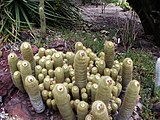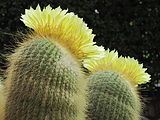Parodia leninghausii
| Parodia leninghausii | |
|---|---|

| |
| Scientific classification | |
| Kingdom: | Plantae |
| Clade: | Tracheophytes |
| Clade: | Angiosperms |
| Clade: | Eudicots |
| Order: | Caryophyllales |
| Family: | Cactaceae |
| Subfamily: | Cactoideae |
| Genus: | Parodia |
| Species: | P. leninghausii
|
| Binomial name | |
| Parodia leninghausii | |
| Synonyms | |
|
Notocactus leninghausii | |
Parodia leninghausii is a species of South American cactus commonly found as a houseplant. Common names include lemon ball cactus, golden ball cactus and yellow tower cactus.
Botanist Karl Moritz Schumann named it after Wilhelm Lenninghaus (1845-1918),[1] a native of North Rhine-Westphalia who, in the 1880s, left his hometown of Ennepetal and emigrated to Porto Alegre, Brazil, where he became Guillermo Lenninghaus, and collected cacti for the German grower Haage.
Parodia leninghausii is native to the Rio Grande do Sul province in the south of Brazil. In those regions, winter nights are cold, with a light freeze. These cacti survive in these conditions because they are quite dry at that time.
Parodia leninghausii shows cactus species nomadism; it was successively included in genus Pilocereus K. Schumann 1895, Malacocarpus (K.Schumann) Britton & Rose 1922, Notocactus (K.Schumann) A.Berger 1929, Eriocactus (K.Schumann) Backeberg 1942, and finally ended up in Parodia (K. Schumann) F.H.Brandt 1982.
Description
[edit]The species have many thin golden spines. The young plants are globular, then columnar up to 1m tall, 12 cm diameter and about 30 ribs. Old plants cluster from the base. Flowers are yellow, 5 cm diameter, at the top of the plants, but only if adult (at least 20 cm tall)
Sometimes, they present monstruous forms. There is a cultivar albispina with white spines.
Cultivation
[edit]Like most cacti, Parodia leninghausii needs well drained soil, sunny exposure, regular watering in summer and no watering in winter. In temperate climates, it may be placed outside in a warm sunny position during the summer months. In winter the plant tolerates frost at −4 °C (25 °F) if kept totally dry. In cultivation, it is preferable to keep a cold temperature, but more than 2 °C (36 °F)
This plant has won the Royal Horticultural Society's Award of Garden Merit.[2]
-
Lemon ball cluster, Huntington Desert Garden
-
Flowers
-
The flower of Parodia leninghausii
-
The seeds of Parodia leninghausii
-
The autumnal flowering of Parodia leninghausii in Rome
References
[edit]- ^ Note: His name was Lenninghaus, but the species is leninghausii without the double "n".
- ^ "Parodia leninghausii". www.rhs.org. Royal Horticultural Society. Retrieved 24 January 2021.
Sources
[edit]- Anderson, Edward F. (2001) The Cactus Family Timber Press, Portland, Oregon, pp. 544–545, ISBN 0-88192-498-9
External links
[edit] Media related to Parodia lenninghausii at Wikimedia Commons
Media related to Parodia lenninghausii at Wikimedia Commons- (in French) Photos on www.AIAPS.org
- (in English) photos on www.cactiguide.com
- IPNI Listing
- Kew Plant List





